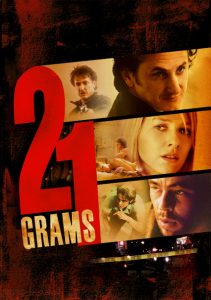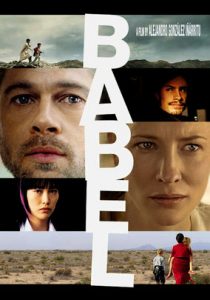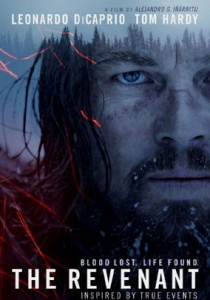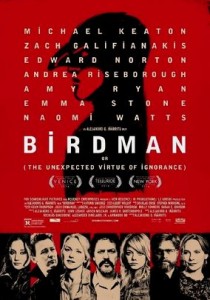21 Grams-2003
Director Alejandro G. Iñárritu
Starring Sean Penn, Naomi Watts, Benicio Del Toro
Scott’s Review #990
Reviewed February 14, 2020
Grade: A
21 Grams (2003) is an independent drama containing crisp writing, top-notch acting, and a unique directing style by Alejandro G. Iñárritu.
An early work by the acclaimed director, he delivers a powerful exposure to the human condition using intersecting storylines.
The result is a powerful emotional response that resonates among viewers taking the time to let the story evolve and marinate.
Outstanding filmmaking and a sign of things to come for the director.
The film is the second part of screenwriter Guillermo Arriaga’s and Iñárritu’s Trilogy of Death, preceded by Amores Perros (2000) and followed by Babel (2006), 21 Grams interweaves several plot lines in a nonlinear arrangement.
Viewing the films in the sequence is not required to appreciate and revel in the gorgeous storytelling and mood.
The story is told in a non-linear fashion and focuses on three main characters, each with a “past”, a “present”, and a “future” story thread. Events culminate in a horrific automobile accident, which is the overall story. The sub-story fragments delve into the lives of the principals as the audience learns more about them.
Ultimately, all three lives intersect in dramatic fashion leaving the viewer mesmerized and energized by the deep connections.
Paul Rivers (Sean Penn) is a successful, married college mathematics professor who desperately needs a heart transplant. He and his wife are considering having a baby in case he should die.
Cristina Peck (Naomi Watts) is a recovering drug addict now living a happy suburban life with a loving husband and two young children.
Jack Jordan (Benicio Del Toro) is a former convict who is using his newfound religious faith to recover from drug addiction and alcoholism and live a happy existence with his wife and kids. After the car accident, each life takes a shocking turn forever changing things.
The multiple timelines and back-and-forth storytelling are an excellent part of 21 Grams, adding layers upon layers of potential entanglements among the characters. This could be a confusing quality, but instead, it provides mystique and endless possibilities.
What worked so well in the outstanding Traffic (2000) is used by Inarritu and delivers. The recipe of clever plotting characters the audience cares about and top-notch acting is created, mixed, and served on a silver platter.
Penn, Watts, and Del Toro are stellar actors who give their characters strength, sympathy, and glory. Each has suffered greatly and faced (or faces) tremendous obstacles in life, soliciting feelings from viewers.
All three are good characters, trying to do the right thing, and grasp hold of any sliver of happiness they can find. They have moral sensibilities without being judgmental, delicious is how each character interacts with the others, but in differing ways.
The film is not happy and not for young kids, but the brilliant elements will leave the film lover agape at the qualities featured. The dark, muted lighting of the film is perfect for the morbid stories told throughout and the common themes of anguish, courage, and desperation.
The clever title refers to an experiment in 1907 that attempted to show scientific proof of the existence of the soul by recording a loss of body weight (said to represent the departure of the soul) immediately following death.
Only the second full-length film in Inarritu’s young career, 21 Grams is brilliant in human emotion and connections. The powerful director would go on to create Babel (2006) and The Revenant (2015), two vastly different films but with similar hearts.
21 Grams (2003) is a wonderful introduction to good things to come while utilizing crafty acting and layered writing to create a gem well worth repeated viewings.
Oscar Nominations: Best Actress-Naomi Watts, Best Supporting Actor-Benicio del Toro
Independent Spirit Award Nominations: 1 win-Special Distinction Award (won)



